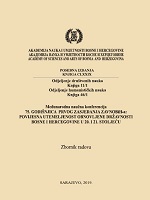KONTINUITET DRŽAVNOSTI BOSNE I HERCEGOVINE, ZAVNOBIH I EVROPSKE INTEGRACIJE
THE CONTINUITY OF LEGAL SYSTEM IN BOSNIA AND HERZEGOVINA, ZAVNOBIH AND EUROPEAN INTEGRATIONS
Author(s): Dženana Čaušević
Subject(s): History of Law, Political history, Recent History (1900 till today), EU-Approach / EU-Accession / EU-Development
Published by: Akademija Nauka i Umjetnosti Bosne i Hercegovine
Keywords: Bosnia and Herzegovina; Statehood of Bosnia and Herzegovina; ZAVNOBIH; European integrations; European Union; NATO;
Summary/Abstract: The process of European integrations as a means of establishing lasting peace and stability in Europe is a phenomenon of the twentieth century. The idea of the unification of Europe was already present in the 15th century. The foundations of European integrations were set after the First World War, and the actual process of integration began in the middle of last century. Jean Monnet, Robert Schuman and others pledged to create a political union, the European Federation, today the European Union. Considering the position and continuity in the development of the state of Bosnia and Herzegovina, in the context of European integrations, it can be emphasized that, since its inception in the early Middle Ages, and later in its historical development, Bosnia was characterized by certain specificities in geopolitical, cultural, historical and civilization, always belonging to the European circle of states. The basic features of its millennial existence are the continuity of the territory in the historical borders, the continuity of the name of Bosnia and the continuity of state-law development. In this context, the constitution of ZAVNOBIH, as a war parliament during the Second World War, whose decisions had constitutional and international legal character, represents the legitimate act of this multi-century continuity and its political identity. In this context, the importance of ZAVNOBIH should be emphasized in particular having in mind to the fact that after the 6. January 1929 Regime and the occupation of 1941, by the Decision of the First Session of ZAVNOBIH, the territorial unity of BIH was re-established and its statehood has been restored. This was confirmed by the decisions of the Second AVNOJ Session. At its Second Session, ZAVNOBIH was constituted in the most legislative and executive body of Bosnia and Herzegovina. By the decisions of the Third Session of ZAVNOBIH the building of the government system and state structure were completed. It is important to point out that all the decisions of ZAVNOBIH, as a war parliament, were made under the conditions of the anti-fascist war in Europe as well as in Bosnia and Herzegovina. These decisions were legitimate, they had constitutional and international legal significance in accordance with the Atlantic Charter and the UN Charter. Given the current circumstances in Bosnia and Herzegovina, its accession to the NATO alliance and its integration into the European Union, the internal unity and stability of this country would be achieved. This would have the effect of weakening the tendency for further ethnic divisions, and the lofty aspirations of the neighbouring countries to divide Bosnia and Herzegovina would also be weakened. Finally, the inclusion of Bosnia and Herzegovina into the NATO Alliance represents a guarantee of its future, and integration into the European Union is its only path to stability and peace in these areas.
- Page Range: 535-555
- Page Count: 21
- Publication Year: 2019
- Language: Bosnian
- Content File-PDF

